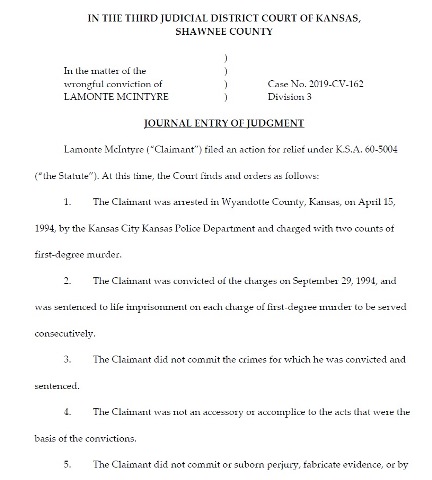
The state attorney general’s office has resolved a third lawsuit filed under the state’s mistaken-conviction statute enacted by the legislature in 2018, Kansas Attorney General Derek Schmidt said today.
The attorney general reached an agreed resolution of a mistaken-conviction lawsuit filed by Lamonte McIntyre in March 2019, according to a news release today. McIntyre was granted total compensation of about $1.5 million by the Shawnee County District Court, and the payment of the amount is subject to review by the State Finance Council.
McIntyre served 23 years in prison for the 1994 murders of Donald Ewing and Doniel Quinn before being ordered released in 2017 by a Wyandotte County court reviewing the case. The agreed resolution was approved today in Shawnee County District Court by Judge Teresa L. Watson.
“We are committed to faithfully administering the state’s mistaken-conviction law as the legislature wrote it,” Schmidt said. “In this case, our office worked diligently to obtain and review all available evidence, including evidence identified but not provided in the earlier judicial proceedings. We were ultimately able to resolve all issues, satisfy all of the statute’s requirements, and agree to this outcome so Mr. McIntyre can receive the benefits to which he is entitled by law because of his mistaken conviction.”
In the agreed order, the court determined that McIntyre did not commit the crime or crimes for which he was convicted, nor was he an accessory or accomplice to that crime or crimes, nor did he suborn perjury, fabricate evidence or cause or bring about the conviction. Between April 1994 and October 2017 McIntyre served 8,583 days in prison or jail. The law states that the wrongfully convicted may receive $65,000 a year for the amount of time spent in prison or jail.
Accordingly, the court ordered the following relief for McIntyre, as provided by the mistaken-conviction statute:
• He was granted a Certificate of Innocence.
• Records of his conviction, arrest, and DNA profile record information were ordered expunged.
• He was granted total compensation of $1,553,379.45.
• He was granted counseling.
• He was granted permission to participate in the state health care benefits program for plan years 2020 and 2021.
• He was granted a waiver of tuition and required fees for attendance at a postsecondary educational institution for up to 130 credit hours.
By law, payment on the state judgment entered today is subject to review by the State Finance Council. Schmidt today formally asked the Finance Council to review the matter promptly.
The court order also awarded $6,682.50 for 23.5 hours of work by Lathrop Gage and $18,037.50 for 53.1 hours of work by Morgan Pilate LLC, law firms.
According to the court order, if McIntyre wins a separate monetary award against the state or any unit of government in a civil action related to his wrongful incarceration, he would have to reimburse the state for the amount of money that is paid in the judgment announced today.
In addition to McIntyre, five other people have filed claims for compensation pursuant to the new wrongful conviction statute. The state previously agreed to court-ordered payments to Richard Jones in a case arising from Johnson County and to Floyd Bledsoe in a case arising from Jefferson County.
Three other cases, two arising from Sedgwick County and one from Clay County, remain pending in various stages of litigation.
Copies of the orders entered today “In the matter of the wrongful conviction of Lamonte McIntyre,” Shawnee County Case No. 2019-CV-162, are available at https://bit.ly/2wGDSVn.


This is great. Now we just need to get that money back from the “public servants” who were responsible for the conviction in the first place.